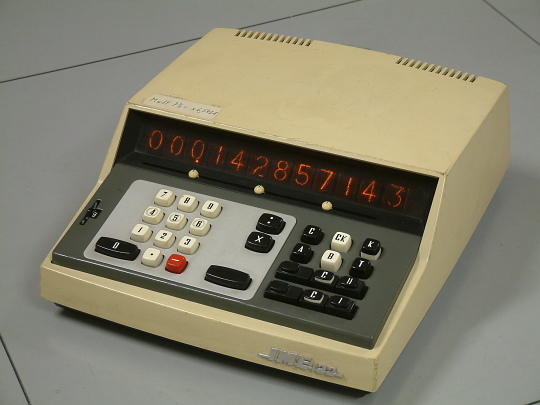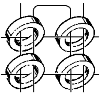IME 122

<<< *** >>> ^^^
| Manufacturer: | industria macchine elettronicche IME S.p.A - Roma |
| Type: | 122 |
| Year: | 1970 |
| Technology: | TTL, core memory |
| Price: | 1970: DM 3750,- (IME 121: 2995,-) (IME 120: 2490,-) 1972: DM 1695,- (IME 121: 1295,-) (IME 120: 995,-) |
| IME 121 has one memory, IME 120 has no memory |
This nice little desktop calculator looks like a half scale version of
it's older sisters the ime 84 and ime 86.
It is computationally improved, for example the comma works now correctly.
Additionally it has two memory registers which can be used as calculating
registers or as pure storage registers. Core memory is refined, so that
memory contents are retained when the machine is switched of.
The electronic of the machine is realized with an extremely strange IC- family: SN 14..N. We don't have any information about this serie. It seems to be a parallel family of the SN 74..N. The typical low and medium integrated circuits are used in the ime 122, but with differing series number SN 14:

SN 1400, SN 1401, SN 1474, SN 1482, SN 1483, SN 1490, SN 1493.
The machine uses a large number of SN 1401 circuits which would have
open collector outputs, but also SN 1400 which would have push-pull
outputs as SN 7400. On the other hand, there are nearly no pull-up
resistors on the printed boards, we suppose this could be a pin and
function compatible series which have generally no push-pull outputs but
rather single ended outputs with integrated pull-up resistors.
The types with push-pull outputs in the SN 74xx series could have for
example 2k collector resistors, and the open collector types of the
SN 74.. series could have 6k collector resistors.
With this technology it would be possible to realize wired-AND and
wired-OR gates without the otherwise needed pull-up resistors.
For example it would even be possible to connect outputs of flip-flops
in parallel to save additional gates.
This is a guess and in the moment we have no idea to verify it without
desoldering some of the ICs.
